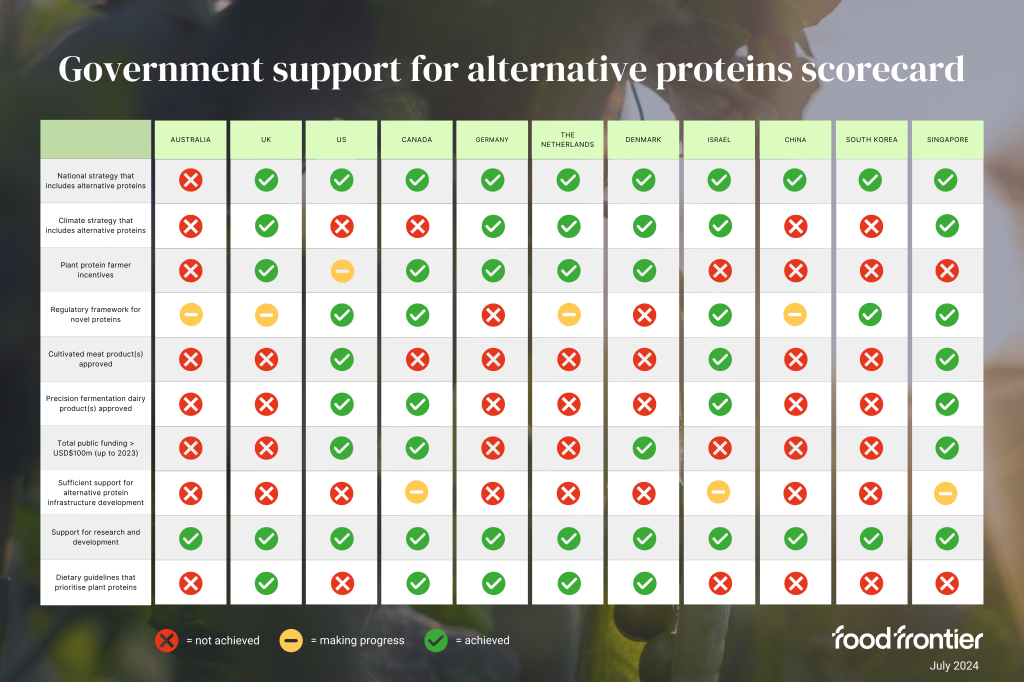Australia falls in last place among ten countries in public support for alternative proteins, according to a new scorecard from think tank Food Frontier.
According to the Government support for alternative proteins scorecard, Australia falls dramatically short across 10 key parameters considered crucial for the growth of the industry, scoring just 1.5 compared to Canada and Singapore’s score of 7.5.
According to the scorecard – which includes the UK, US, Canada, Germany, the Netherlands, Denmark, Israel, China, South Korea, and Singapore – the only parameters in which Australia was given a positive score of “achieved” or “making progress” were support for research and development and building regulatory frameworks for novel proteins, respectively. The country was listed as “not achieved” in the remaining eight.
Australia was also the only country included in the scorecard to not have a national strategy that includes alternative proteins. That’s as governments across the globe are setting such targets and roadmaps for success, such as Singapore’s ‘30 by 30’ food security initiative and Denmark’s plant-based action plan.
Food Frontier noted that the situation places Australia at a significant disadvantage, particularly as the governments of countries like Singapore and Canada ramp up their support for the transition towards more alternative proteins.

Dr Simon Eassom, CEO of Food Frontier, said, “This comparison clearly indicates where Australia is lagging and should serve as a wake-up call to the opportunities available.
“Certain countries have already established themselves as global leaders in the plant-based and cultivated meat industries and are capitalising on the benefits of this. With the right government support, Australia can thrive in this sector, too and cement its own place as a leader in food and agricultural production.”
Dr Eassom still praised the fact that six out of the 11 countries on the scorecard had implemented a climate strategy that mentions alternative proteins.
Australia dragging on public funding for alt proteins
The Food Frontier scorecard is only the latest research to identify Australia’s lagging status in public support for its domestic novel proteins sector.
According to GFI’s recently published 2023 State of Global Policy, Australia ranked 9th for total public investment in 2023 at $13 million. Meanwhile, the US, Canada, Denmark and Singapore have each surpassed the USD$100m mark for total public funding (up to 2023), with Australia only investing a total of USD$53.7m, nearly half the number of those other countries.
The GFI report notes that as recently as 2022, Australia’s plant-based protein sector was positioned to be one of the best-supported in the world, second only to Canada. That was due almost entirely to the federal government’s announcement of a AUD$113 million ($82.8 million) grant for the construction of three state-of-the-art pulse protein facilities.
However the new government’s rescinded this grant and seven other projects in 2023, setting back Australia’s progress significantly.

The report, however, does point out that despite the lack of federal government support, four of Australia’s six state governments still took action to boost their local alternative protein industries in 2023. For example, the government of Western Australia allocated AUD $5 million ($3.3 million) to support the construction of a factory that will produce oat milk enriched with lupin protein, both from locally-grown crops.
Food Frontier has outlined a series of recommendations for the federal government including a national food plan that supports existing agrifood industries to become more sustainable and prioritises the growth of innovative food industries including alternative proteins.
The think tank also emphasised that Australia should take advantage of its proximity to Asia, as it is well positioned to tap into the region’s growing demand for plant-based and cultivated proteins.
To stay up-to-date on the latest industry headlines, sign up to Future Alternative’s enewsletter.
Posted on:


